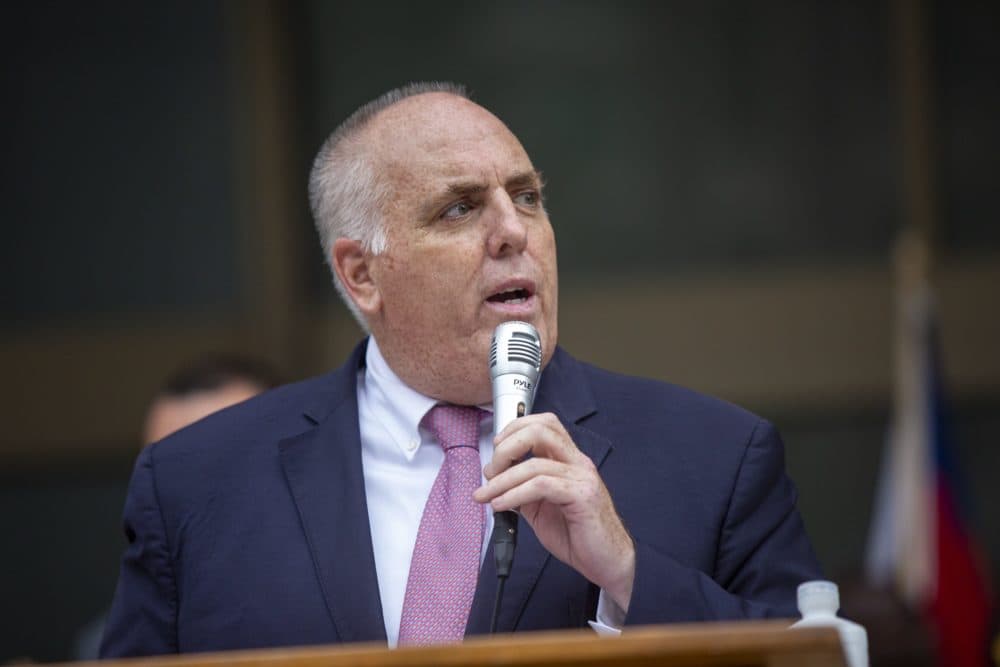Advertisement
Boston city councilors debate chances of Wu's rent control plan surviving Beacon Hill

As the conversation about rent control in Boston heats up, city councilors have to contend with how aggressively they want to pursue a policy that will eventually need to win approval from state lawmakers who have historically opposed the measure.
At a public hearing Wednesday, City Council President Ed Flynn said even if the city council and Wu pass the measure, the Legislature would then have to approve the policy and send it along to Gov. Maura Healey.
Flynn suggested the city should first find out what leaders on Beacon Hill would consider.
"So we are presenting them a proposal that we know that's going to get signed instead of just sending a proposal up there that we know is going to die up there we should have an idea of the statehouse leadership will accept what they will sign," Flynn said.
But on Wednesday progressive councilors argued against aspects of Wu's proposal that they thought were not ambitious enough to solve Boston's housing crisis.
Wu's rent stabilization and "just cause" tenant eviction proposal before the council would limit annual rent hikes within city limits to 6% plus the change in the Consumer Price Index, with a cap of 10% in high-inflation years. It would also exempt live-in small landlords in two- to six-unit buildings, as well as new construction for 15 years, in a bid to avoid disincentivizing new development.
Councilor Julia Mejia pushed back on the 15-year exemption for new construction, saying new developments should also be "accountable in the solutions around stabilizing rents."
"The time is now for us to be incredibly bold, aggressive," she said. "I am looking forward for us to have the political will that this moment is calling for, and I think the harder we can go, the more inclined we are to definitely keep our residents here in the city of Boston."
Councilor Kendra Lara took issue with Wu's suggested cap of the CPI plus 6%, calling it "untenable." Lara argued that because rents in recent years have grown at a rate below the cap, the policy would give landlords a green light to pursue even larger rent hikes.
"We are not giving people a limit. We are giving them an allowance," Lara said. "All of the conversations that we're having here today have made it very obvious that we're trying to protect profit while also trying to protect people's right to have a roof over their head ... People are going to do what they can to make as much profit as possible."
Others on the council, like Flynn, said the 6% plus CPI cap seemed "reasonable" and "like a compromise."
Wednesday's hearing was a mix of support and criticism even from advocacy and industry groups. Progressive tenant advocates criticized Mayor Michelle Wu's rent stabilization proposal as being too moderate, while the Greater Boston Real Estate Board is launching a $400,000 campaign against the measure, saying it will lead to decreased development of new units in the city.
Rent control was made illegal on a state level in 1994 when voters narrowly decided at the ballot box to prohibit limiting how much rent can grow for tenants year after year.
Though Healey, unlike her predecessor, has not spoken out against rent control, she also has not made explicit if she will sign a measure allowing Boston to revive its own local policy despite the statewide ban, saying she generally supports local efforts to make their own decisions.
Legislative leaders have shown little interest in reviving rent control after the statewide ballot question banned the practice, and several councilors in Wednesday's hearing brought up the "Jim Brooks" bill, which the city passed to prevent "no-cause" housing evictions in 2017, but died at the State House.
"We're having good conversations with the Boston delegation, and they're very interested in seeing the home rule that comes up, but they'll have their own hearings," said Boston housing chief Sheila Dillon. "The whole state will vote on this, so I think it's impossible at this point in time to know exactly what they will and will not approve."
State Sen. Lydia Edwards, who co-chairs the Legislature's Joint Committee on Housing, declined to comment on the proposed home rule petition. House co-chair James Arciero did not respond to request for comment.
"Out of respect for the process underway in the Boston City Council, I won't be speaking on this issue," Edwards, who served on the City Council until she joined the Senate last year, said.